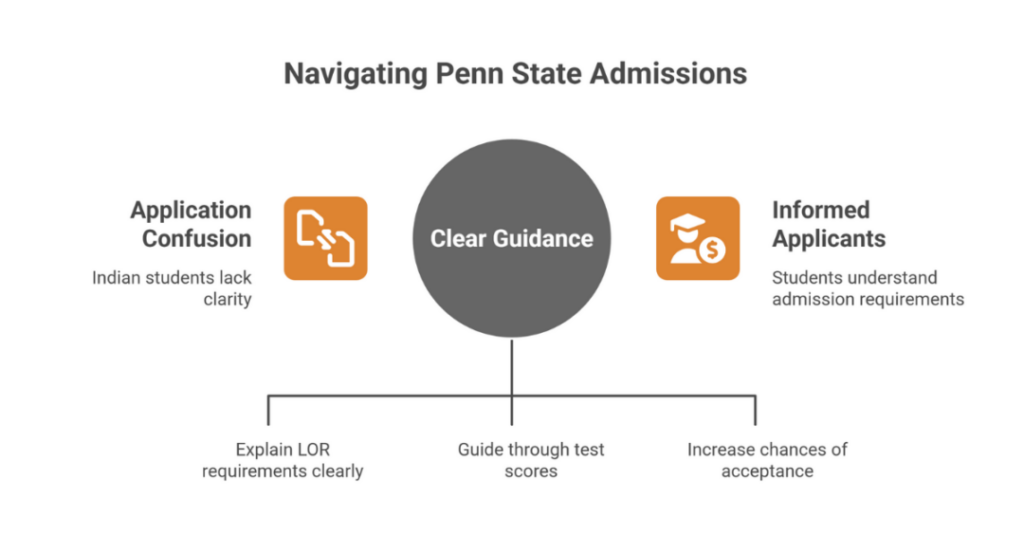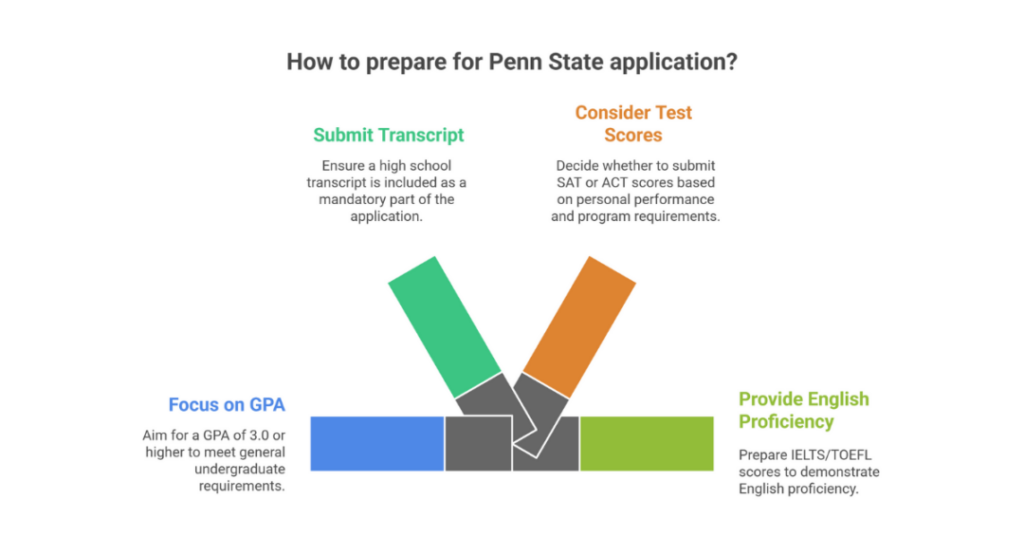2 September 2025
5 minutes read
Does Penn State Require Letters of Recommendation for Indian Students in Their First-Year Admission Requirements?

Key Takeaways
- Does Penn State require letters of recommendation: No, Penn State does not require them for first-year applicants, though an optional additional letter can be submitted.
- Does Penn State require letters of recommendation: Applicants may include one if it adds perspective otherwise missing, but it is never mandatory.
- Does Penn State require letters of recommendation: Only Schreyer Honors College may require separate application materials, including recommendation letters.
Pennsylvania State University‘s reputation is unquestionable and one of the top recognized colleges in the United States, which attracts thousands of international students, including many from India, every year. In thinking about the Penn State application process, Indian students often want to know if Penn State wants LORs as a requirement for admission or not.
This article provides a clear overview of Penn State’s guidance on admissions requirements. We will go through LOR in application requirements and ensure that applicants have all the information they need to navigate from your test scores to your score-transcripts, while boosting their chances of being accepted.
How to Apply to Penn State as an Indian Student?
Finding out that Penn State accepts the Common App and the Coalition Application will allow flexibility for applicants. At first glance, it may seem that the Penn State application process for an Indian high school student is complex.

But when you break down the process into steps, it becomes easier.
- Choose your platform: The first step in the application process is to submit your college application in either the Common App or Coalition Application portal, where you can upload documents, including your high school-transcript, test scores, and personal statement.
- Prepare all required documents: The application documentation you need will be your transcripts, high school GPA, SAT or ACT scores (if sent), English proficiency tests, such as IELTS or TOEFL, and a resume or statement of purposes, if desired.
- Take note of deadlines: Penn admissions put emphasis on deadline submission. You can submit your application for Early Action or by the Regular deadline; therefore, you want to submit an application early, so you maximize your chance of admission.
Does Penn State Require Letters of Recommendation for Indian Students?
Fun fact: Penn State does not require LOR for first-year applicants, a policy that often surprises high school students, but eases the burden and distractions for general undergraduate applicants.
Even so, students may elect to submit an optional additional letter of recommendation with the belief it enhances their application.
- Penn State does not require letters: Penn State does not require LOR for first-year applicants, relieving pressure on students and recommenders.
- Optional Submission: Students may choose to submit an optional additional LOR especially if it provides a perspective that might be missing from your application.
- Schreyer Honors College: Students applying to Schreyer Honors College have different admissions requirements and may have to submit a number of letters or additional documents.
Comparison Table: Recommendation Requirements
| Application Type | Requirement |
|---|---|
| General Undergraduate | Penn State does not require LOR |
| Optional Submissions | Optional submitted as an additional recommendation. |
| Schreyer Honors College | May have to separately submit an application and LORs. |
Penn State Admissions Process and GPA Requirements for First-Year
Did you know Penn State employs a holistic review process when evaluating applications? This means Penn State looks beyond the numbers. If you are an Indian student wondering about applying, it may be relevant to note that Penn State’s admission criteria are not exactly the same regardless of academic programs and campus locations including University Park.
The table below can help you understand the GPA and test score expectations:
| Criteria | General Undergraduate Application |
| High School GPA | Typically 3.0 or higher (may honour programs) |
| High School-Transcript | Required as part of your application |
| SAT or ACT Scores | Optional; we leave that choice up to you |
| IELTS/TOEFL (International) | Required as evidence of English proficiency |
| Admission Decision Basis | Academic performance and potential for career success |
Do I Need to Submit Letters of Recommendation or a Recommendation Letter?
Here is an interesting fact; Penn State does not require letters of recommendation unlike many universities.

However, an optional additional letter of recommendation may be submitted as part of your application if you would like admissions committees to learn more about your character, or can boast in appreciable achievements about yourself. This optional letter may enhance your opportunity to be admitted, but not required.
Should You Request Letters of Recommendation From People Who Know You Well?
Interestingly, Penn State doesn’t require letters of recommendation, but many students will still opt to submit them. If you decide to submit letters of recommendation, be sure that they come from someone who knows you well – an advice counselor, teacher from junior or senior, or an official school worker.
They can provide commentary from a different diversity of perspective in your application, when you may otherwise not have any.
Documents and Exams Needed for Penn State Application
Did you know? Even though standardized testing may seem limiting, Penn State flexibility in application allows you to submit SAT or ACT scores. Students who are applying from India to Penn State University will need to prepare several important documents needed for admission and standardized testing. Documents include transcripts, test-scores, and proof of English proficiency.
Documents and Exams for Penn-State Application
| Document/Exam | Requirement |
| High School Transcript | Required as a portion of your college application |
| High School GPA | Required; will factor in admission |
| SAT or ACT Scores | Optional; student applicants can submit |
| IELTS/TOEFL/GRE/GMAT | Are required, depending on the academic programs |
| Personal Statement/Common App Essay | Required as a portion of your application |
| Statement of Purpose | Sometimes required for the academic programs |
| Resume | Only if submitted or requested |
| Application Fee Waiver | Available if you qualify |
Conclusion
Penn State University helps eliminate the requirements and uncertainty of the college application process for international students, as well as other applicants, by clarifying that Penn State does not require letters of recommendation. You may voluntarily include an additional letter of recommendation, which is optional, and does not factor into the admission decision.
The admission requirements for Penn State are pretty straightforward – transcripts and test scores – and all high school students have equitable opportunities. Are you interested in attending Penn State?
Reach out to Ambitio, your trusted admissions experts, to help you move through the Penn-State application process smoothly.
FAQs
Does Penn State require letters of recommendation for first-year applicants?
Does Penn State require letters of recommendation for first-year applicants is a common question, and the answer is no, Penn State does not require letters of recommendation.
Does Penn State require letters of recommendation for Indian students?
Does Penn State require letters of recommendation for Indian students often confuses applicants, but Penn State does not require letters of recommendation for them.
Does Penn State require letters of recommendation for Schreyer Honors College?
Does Penn State require letters of recommendation for Schreyer Honors College is answered with a yes, as the honors college may require additional application materials.
Does Penn State require letters of recommendation on the Common App?
Does Penn State require letters of recommendation on the Common App has a simple answer—no, Penn State does not require letters of recommendation even through the Common App.
Does Penn State require letters of recommendation for transfer applicants?
Does Penn State require letters of recommendation for transfer applicants has the same response—no, Penn State does not require letters of recommendation for transfer students.
Does Penn State require letters of recommendation for graduate programs?
Does Penn State require letters of recommendation for graduate programs depends on the program, as some graduate applications may require letters while undergraduate ones do not.
Does Penn State require letters of recommendation to improve chances of admission?
Does Penn State require letters of recommendation to improve chances of admission has a clear answer—no, Penn State does not require letters of recommendation, but optional ones may be submitted.

You can study at top universities worldwide!
Get expert tips and tricks to get into top universities with a free expert session.
Book Your Free 30-Minute Session Now! Book a call now




























